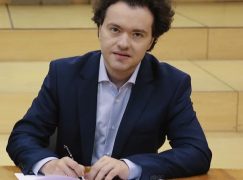Meet Kissin the composer
mainThe caption reads: Evgeny Kissin performing his very own ‘Toccata’ at the 2017 Verbier Festival, enjoy!
In his recent Memoir and Reflections, Kissin talks of taking time out to compose.

The caption reads: Evgeny Kissin performing his very own ‘Toccata’ at the 2017 Verbier Festival, enjoy!
In his recent Memoir and Reflections, Kissin talks of taking time out to compose.
We hear that two string players in the…

The leading Mexican conductor Enrique Batiz died yesterday…

From the Santa Fe New Mexican: Charles MacKay,…

The London Philharmonic Orchestra has appointed Jesús Herrera…

Session expired
Please log in again. The login page will open in a new tab. After logging in you can close it and return to this page.
Comments